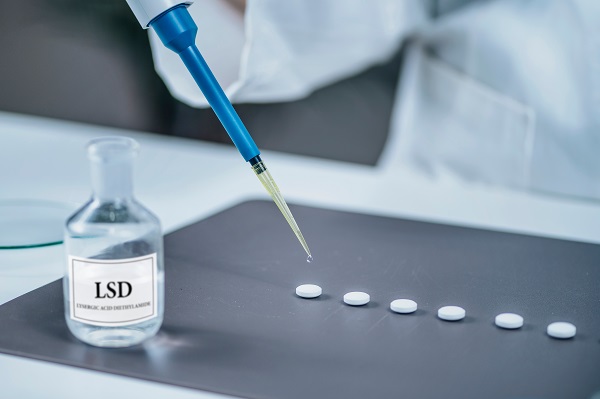By Barbara Greenwood Dufour
The mention of psychedelics may bring to mind the counterculture movements of the 1960s and 1970s. So, we might not immediately think of these drugs in terms of their place in clinical therapy. But psychedelics were originally investigated in western medicine as medical treatments. Political concerns, as well as methodological issues with the research, put an end to their potential use in mainstream medicine — at least for a time.
Concerns around the lack of innovation in, and effective treatments for, mental health disorders have recently renewed interest in psychedelics as a therapeutic option. Now that improvements in research methods have addressed the previous methodological issues, minds are opening to the idea of psychedelics being used alongside psychotherapy to treat mental health conditions.
Psychedelics can cause hallucinations, which is why they’re sometimes called hallucinogens. They include drugs such as psilocybin (also known as magic mushrooms), LSD (lysergic acid diethylamide), mescalin, and ayahuasca. There are some psychedelics that also produce a feeling of being out of control or disconnected from one’s body and environment. These are also referred to as dissociative drugs. Examples of these include PCP (phencyclidine), ketamine, dextromethorphan, and Salvia. There are other types of psychedelics as well, such as the atypical hallucinogen ibogaine and the enactogen MDMA (3,4-Methylenedioxymethamphetamine).
Essentially, psychedelics are group of substances that can affect a person’s subjective perspectives or change the way they process thoughts, emotions, and behaviours. It’s this change in perception and awareness that’s thought to give psychedelics the potential to make psychotherapy — such as cognitive behavioural therapy or other types of talk therapy — more effective.
Psychedelic-assisted psychotherapy is currently in limited use. It’s provided in research settings by medical professionals who are trained to administer psychedelics and monitor their effect during psychotherapy sessions. The psychotherapy itself is meant to change dysfunctional thinking patterns by teaching coping strategies and skills. The psychedelics, which might be given during one or more of the sessions, are intended to help patients be more open to and able to adopt the skills and strategies.
Psychedelic-assisted psychotherapy might be a new option for treating various mental health conditions. This could be an especially important development for people in whom the conventional medications and psychotherapy alone haven’t worked well. To find out if there’s evidence that psychedelic-assisted psychotherapy is effective, CADTH recently looked for the latest research on this topic. CADTH is an independent agency that finds, assesses, and summarizes the research on drugs, medical devices, tests, and procedures.
CADTH’s found two systematic reviews (which included 31 individual relevant studies) and three randomized controlled trials (RCTs) on various combinations of psychedelic-assisted psychotherapy for anxiety, mood disorders, substance use disorder, or post-traumatic stress disorder (PTSD). The treatments most studied in the systematic reviews were MDMA-assisted psychotherapy for PTSD and psilocybin-assisted psychotherapy for treatment-resistant depression. Two of the RCTs looked at ketamine-assisted psychotherapy for substance (alcohol, cocaine) use or dependence. The third looked at psilocybin-assisted supportive psychotherapy for treating major depressive disorder. Both systematic reviews and the RCTs concluded that psychedelic-assisted psychotherapy is generally led to an improvement in symptoms and outcomes.
While the evidence suggests that these treatments are effective, what about the possible risks of using psychedelics alongside psychotherapy? To answer that question, CADTH found two safety trials that looked at the safety of MDMA-assisted psychotherapy — for alcohol use disorder in one trial and for PTSD in the other — and both found the treatment to be safe and well-tolerated. In addition, one of the systematic reviews and all the randomized controlled trials captured adverse events and none was reported.
There is increasing demand in Canada for access to therapy using psychedelics. For mental health and substance use disorders, psychedelic-assisted psychotherapy could fill the need for additional treatment options. However, the research has some limitations to be mindful of. For example, most of the studies were small (the majority involved less than 20 participants), and they don’t tell us how long the treatment’s benefit could be expected to last (most followed participants for less than a year).
Additional research is in progress — for example, Canadian clinical trials are currently underway for both ketamine-assisted and psilocybin-assisted psychotherapy for treatment-resistant depression. The findings of this and other research might provide greater certainty on the safety and effectiveness of psychedelic-assisted psychotherapy.
You can access CADTH’s report on this topic — Psychedelic-Assisted Psychotherapy for Post-Traumatic Stress Disorder, Anxiety Disorders, Mood Disorders, or Substance Use Disorders — at cadth.ca. CADTH has produced reports on a variety of other mental health-related topics, which you’ll find at cadth.ca/mentalhealth. You can also follow CADTH on Twitter: @CADTH_ACMTS or talk to our Liaison Officer in your region: cadth.ca/contact-us/liaison-officers.
Barbara Greenwood Dufour is a Knowledge Mobilization Officer at CADTH.




